 |
THE ROLE OF ARCHIVISTS IN THE DIGITAL WORLD |
BY NEAL HARMEYER and CARLY DEARBORN
|
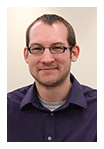  Managing large amounts of data isn’t new to archival science. What is new are the methods in which data is created, stored and preserved. With each passing year the world continues its evolution into digital-born environments; items that were preserved on paper have now been digitized, or content that was once only on paper is now created electronically. Yet no matter the design, medium or format, archivists are professionally equipped to process, preserve and make accessible the materials people create. Due to the ever-changing nature of these creative methods, all archivists today are digital archivists. Or more accurately, all digital archivists are archivists. Any archivist working today must be prepared to navigate all genres and forms of materials, regardless of job title. Managing large amounts of data isn’t new to archival science. What is new are the methods in which data is created, stored and preserved. With each passing year the world continues its evolution into digital-born environments; items that were preserved on paper have now been digitized, or content that was once only on paper is now created electronically. Yet no matter the design, medium or format, archivists are professionally equipped to process, preserve and make accessible the materials people create. Due to the ever-changing nature of these creative methods, all archivists today are digital archivists. Or more accurately, all digital archivists are archivists. Any archivist working today must be prepared to navigate all genres and forms of materials, regardless of job title.
For the most part, the skill set of the archivist has not been dramatically redesigned. Appraisal, acquisition, description and access actions for records still make up the daily duties of archivists. Formats, services, accessibility options and tools may change over time, but core responsibilities are unaltered. Archivists are not unprepared to face challenges posed by content creators; while innovation is necessary to preserve new formats and technologies, archival principles remain intact. Contrary to expectations, one does not require programming skills to be a competent modern-day archivist. “Traditional” or “analog” skills still have relevance in a “digital world” as these traditional skills were created in order to help archivists understand people, processes and records, even in novel scholarly research. Archivists are trained to quickly become experts in a particular field in order to process and describe collections for posterity. The field has always been concerned with access and the techniques required to ensure future access (through preservation activities and metadata creation, for example). Indeed, our core function remains preserving knowledge for future generations to study and use.
Due to the complex nature of digital materials, in an ideal situation the work of archivists does not begin at donation. Archivists also take steps to ensure content is created with long-term preservation in mind, and must take a more active role in the records management practices of donors. Early access to the donor’s files and organization structure allows archivists to more easily process and provide access to the records once they arrive at the archives. This is especially true for donors of digital items who may benefit from guidance on issues like naming conventions, sustainable file formats, and basic appraisal techniques. This is commonly referred to as a post-custodial approach to collection development. It empowers the record-creator to begin curation and limits the bulk of donated collections; therefore, the burden on the archives’ resources at the time of donation is lessened, as content format, description and arrangement have already undergone some level of critical analysis. In the same vein, archivists must also work with creators who may be interested in digitizing paper-born records; undertaking a role in the creation of digital surrogates from analog items informs both parties. Creators are educated about proper hardware and software tools and requirements for preservation while concurrently archivists have the opportunity to learn about the content and its creators. With these practices in mind, archivists within Purdue Archives and Special Collections have reached out to parties in departments across campus with positive results. Based on the work of Lauren White, former Project Archivist for University Records, new partnerships and collaborations have begun with more expected in the future.
Formats, services and accessibility to archival material is changing but our philosophy as a field is not changing. Archivists today continue to partner with faculty and instructors to educate students in all disciplines regarding use of primary source materials. Collections are processed and made available to researchers around the world. All of these things occur regardless of format. That said, due to the increasing volume of digital formats, it is necessary to rethink traditional workflows. The methods utilized to share and describe archival materials today may not always be the best option. Archivists must be innovative, seeking out new methods of systematically transferring, describing, preserving and providing access to digital content. Carly and Neal’s work with departments across campus and with programs such as the MetaArchive and PURR demonstrate the impact archival expertise on issues related to records management, data curation and study of digital historiography. The large amount of digital-born materials at an institution like Purdue means a tremendous amount of resources are needed to process a collection. Providing access and instruction to students requires even more resources. Thinking strategically, taking an active role, and building infrastructures allows archivists to formulate the next-generation of archival methodologies and roles while also adhering to core values.
|
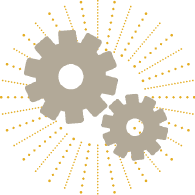 |
IN MEMORY OF THOMAS S. WILMETH |
| |
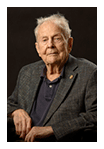 Long-time philanthropist and contributor to Purdue University Libraries, Thomas S. Wilmeth passed away on January 5, 2015. He was born October 2, 1913. A lifelong entrepreneur, Wilmeth started his first business at age 10. At 16 he enrolled at Purdue. During his senior year, he was the business manager of the Purdue yearbook, Debris. While at Purdue, Wilmeth was a member of Alpha Chi Rho, Tau Beta Pi and Eta Kappa Nu. He graduated magna cum laude at age 21 with a degree in electrical engineering in 1940. Tom and his brother were the founders of Scot Industries, Inc. in 1949. The privately held company is a worldwide quality and technological leader in the specialty tubing and bar business. Long-time philanthropist and contributor to Purdue University Libraries, Thomas S. Wilmeth passed away on January 5, 2015. He was born October 2, 1913. A lifelong entrepreneur, Wilmeth started his first business at age 10. At 16 he enrolled at Purdue. During his senior year, he was the business manager of the Purdue yearbook, Debris. While at Purdue, Wilmeth was a member of Alpha Chi Rho, Tau Beta Pi and Eta Kappa Nu. He graduated magna cum laude at age 21 with a degree in electrical engineering in 1940. Tom and his brother were the founders of Scot Industries, Inc. in 1949. The privately held company is a worldwide quality and technological leader in the specialty tubing and bar business.
Wilmeth's long history of support for the Purdue University Libraries began in 1991, when he made a contribution to fund the Libraries first electronic database. In 1993 he joined the Libraries Dean's Advisory Council and served for 10 years. In 2004 he received the President's Council Distinguished Pinnacle Award for his philanthropy to Purdue Libraries. In 2013 Purdue awarded Wilmeth an honorary doctorate of engineering information literacy in recognition of his understanding and appreciation of the need to use published research outside of academe to advance industrial methods and to create new engineering processes and technological applications. Most recently, in May 2014 the Purdue Board of Trustees approved naming the library within the future Active Learning Center for Thomas and his brother Harvey D. Wilmeth, both graduates of the College of Engineering, in recognition of their gifts totaling $4 million to Purdue University Libraries.
Dean Mullins represented Purdue and Purdue University Libraries at the funeral on January 12 in Daingerfield, Texas. Dean Mullins said, “Having a position as dean of libraries brings me into contact with many outstanding Purdue alumni, however, I can honestly say that few have made a greater impact upon me by their view of life and learning than Tom Wilmeth. He will be greatly missed.” |
 |
IN MEMORY OF DOROTHY NEWBY McCAW |
| |
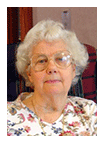 Purdue University Libraries donor, Dorothy Newby McCaw, passed away on January 13, 2015. She was born on November 7, 1925. She was an accomplished pianist and cellist and wrote an operetta, “The Pied Piper.” Dorothy moved to Lafayette with her husband in the late 1940s where she raised their three children. She was a founding member of the Lafayette Symphony Orchestra and later served on the Board of Directors. She was an active member of several local volunteer organizations and her family was instrumental in the development of the Triangle Park in downtown Lafayette. Purdue University Libraries donor, Dorothy Newby McCaw, passed away on January 13, 2015. She was born on November 7, 1925. She was an accomplished pianist and cellist and wrote an operetta, “The Pied Piper.” Dorothy moved to Lafayette with her husband in the late 1940s where she raised their three children. She was a founding member of the Lafayette Symphony Orchestra and later served on the Board of Directors. She was an active member of several local volunteer organizations and her family was instrumental in the development of the Triangle Park in downtown Lafayette.
Dorothy’s family ties to Purdue began with her grandfather who graduated in 1889 in mechanical engineering. Her mother and father met at Purdue and both earned degrees in 1923 and 1924. Her son is a 1972 graduate and her grandson graduated in 1990. Believing that having adequate resources available for research was important, the McCaw’s established an endowment in memory of her mother, The Burrel W. Newby Anthropology Sociology Collection, in 1992 that provided funding for new books. In 2004, the McCaw’s endowed the Dorothy Newby McCaw Scholarship for Libraries Student Workers in honor of former Dean of Libraries, Emily R. Mobley. The scholarship fulfilled one of Mobley's goals as Dean — to recognize top student workers in the Libraries. The first scholarship was awarded in 2007.
The McCaw scholarship represented a significant event in the Libraries Campaign for Purdue, being one of four scholarships raised in support of Libraries student workers.
Nancy Hewison represented Purdue University Libraries at the visitation and expressed gratitude to the family for Dorothy’s commitment to the Libraries and our student staff. |
 |
STUDENT AWARDS AND SCHOLARSHIPS AVAILABLE FOR LIBRARIES STUDENT STAFF |
| BY CHERYL OLIVER |
It is time to encourage your student staff members to apply for the Purdue University Libraries Student Awards, the Dorothy Newby McCaw Scholarship and the Dr. Albert Viton Scholarship. A liball message was sent with the information for the online application process. A flyer was included for you to print and post in your area. Please share the information and encourage your students to apply for the appropriate award and/or scholarship.
We are pleased to announce there are eight (8) awards/scholarships available this year. The application deadline is February 20, 2015.
The PULSE Award
This award was created by the Purdue Libraries Circulation/Reserve Team in 2004. Initial funding was initiated through garage sales, a craft/bake sale and individual donations. In the first year, $1,445.80 was raised from 40 donors. Contributions continued to be added throughout the year with the goal of reaching the $20,000 amount necessary to endow the award. In 2004, Libraries Dean, Jim Mullins, led a fundraising challenge and agreed to match pledges from the Dean's Fund dollar for dollar. In 2005, endowment efforts were achieved with the efforts and contributions of Purdue graduates Mike and Judy Humnicky of California, who both spent their time at Purdue (1966-70) employed by the Libraries. The first two awards were presented in May 2004. This year four $1000 awards are available.
The Dorothy Newby McCaw Scholarship
In 2004, Dorothy Newby McCaw found a meaningful way to honor her friend: she endowed the Dorothy Newby McCaw Scholarship for Libraries Student Workers in honor of Emily R. Mobley, former Libraries Dean. McCaw established the scholarship in honor of Dean Mobley's retirement as a way to recognize her many accomplishments during the 12 years of her deanship. The scholarship fulfilled one of Mobley's goals as Dean — to recognize top student workers in the Libraries. The first scholarship was awarded in 2007. This year two $2500 scholarships are available.
The Dr. Albert Viton Scholarship
In 2006, Dr. Albert Viton, author and retired economist, endowed a scholarship to be awarded annually to a student employee from the Purdue University Press or the Libraries. His desire is that this scholarship will make a significant impact on students' lives and education while at Purdue. Viton became associated with the Press with the publication of his book, The International Sugar Agreements: Promise and Reality, in 2004. The first scholarship was awarded in 2007. This year two $2500 scholarships are available.
Important Information
- All student staff members should receive e-mail notification of this opportunity but please make sure that they are aware of these awards and scholarships and of the February 20 deadline.
- Supervisors, please be aware of your part of the application process and the deadline. Students will not be considered without your portion of the application process.
- The URL for the info is http://www.lib.purdue.edu/pulsescholar
- Remind your senior student staff that they are eligible for the PULSE award if they meet the other criteria.
Selection committee members include: Chair Cheryl Oliver, Co-chair Monica Kirkwood, Kay Schurr, Mary Sego, Angie Ewing, Shannon Walker and Sue Ward
If you have questions please contact Cheryl Oliver at csmith68@purdue.edu or Monica Kirkwood at monicack@purdue.edu. |
 |
LIBRARIES FOR RESEARCH DATA INTEREST GROUP ENDORSED BY RDA |
| |
The Research Data Alliance (RDA) is an international organization that was formed to build social and technical bridges to enable the exchange and reuse of research data. It includes over 2,500 individual members from 92 different countries who represent a broad spectrum of researchers, government agencies, funders, publishers, librarians, technologists and others working together to enhance and facilitate global data sharing.
Purdue Libraries participated in the formation of RDA and belongs to its Organizational Advisory Board. RDA is made up of interest groups that bring together people who are interested in a particular topic or community. Working groups are created by the interest groups to scope, develop, and deliver solutions to specific problems or challenges facing their communities. The first deliverables of RDA’s working groups will be demonstrated at an “Implementation Day” hosted by the San Diego Supercomputer Center preceding the RDA 5th Plenary Meeting, which will take place March 9-11 in California.
This month, the case statement for the Libraries for Research Data Interest Group was reviewed and approved by RDA. This interest group is co-chaired by Michael Witt, Head of the D2C2 at Purdue University, Wolfram Horstmann, University Librarian at the University of Göttingen, and Kathleen Shearer, Executive Director of the Coalition of Open Access Repositories. At the next plenary meeting, the group will be exploring organizational models and policies to support research data in the context of academic and research libraries.

The RDA celebrated the beginning of organizational membership at its 4th plenary meeting in Amsterdam. |
 |
LIBRARIES NEW STAFF |
| |
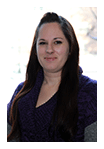 Kaitee Hardesty Kaitee Hardesty
ADM Office
Hello everyone! I am excited and privileged to join the Purdue University Libraries as the new Secretary to the associate deans. I will be providing customer service to anyone who calls or comes into the office, managing schedules and calendars as well as assisting the associate deans with any projects or daily activities they may have.
I am originally from South San Francisco, CA. I was what is considered a “military brat” growing up and moving around the country a lot. However, I spent the longest amount of time here in Lafayette. I attended Jefferson high school but did not start attending college until 4 years ago when I enrolled at Harrison College here in Lafayette. For almost 5 years I was the Office Manager at Hillel Foundation located next door to Marriott Hall.
I am a single mom to two teenagers (yes, I will accept your sympathy) my son, Christian (14) and my daughter, Brooklyn (13 going on 30). When I can get them to be seen with me, we enjoy spending our summer days outdoors fishing, camping, horseback riding, playing any outdoor sports and our winter days playing board games, Uno, bowling or catching up on the latest episodes of Bones, Big Bang Theory and The Walking Dead.
My office is located in Room 271A of Stewart Center and I can be reached by phone at 49-42900 or by email at hardestk@purdue.edu. I hope you’ll stop by and say hello...you never know, I may even bring donuts for everyone.
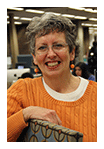 Jody Zink Jody Zink
Hicks Undergraduate Library
I happily joined the Hicks Undergraduate Library as a library assistant on November 17, 2014. I am the Hicks student supervisor creating their work schedules, approving their hours in Kronos, as well as communicating to them any important information regarding their performances and work related items. I create signage for Hicks and work at the iDesk to assist patrons with questions and issues regarding reference, directions and check-out of our equipment.
I am originally from Attica, Indiana and moved to West Lafayette and graduated from Harrison High School. I got my first job at Purdue right after graduation and have been here for 38 years. On April 14, 1979 I married my best friend, Chuck. We moved to Delphi and have lived there ever since. We have one daughter, Darla, who lives in Los Angeles, California. We just got back from visiting her in LA over the Holiday Break. Chuck and I love to travel especially to California and Florida.
In case you haven’t noticed, I love the color orange and as my one and only hobby I collect lots of items that are orange. My biggest collection is my orange teddy bears of which I currently have 54.
My office is located on the ground floor of Hicks, Room G965. I can be reached by phone at 49-46732 or by email at jbzink@purdue.edu. |
 |
AROUND THE LIBRARIES |
| BY PATTY GLASSON |
After many years of cantankerous service to Purdue University Libraries, the Se-Lin label-printing system and its affiliated OKI Microline 390 tractor-feed printer retired in the latter part of 2014 from its position in Metadata Services. Its exit followed the retirement of the last of its caretakers, Connie Smith, who took over label-making duties from Judy Humberg in 2010.
The Se-Lin system was never particularly user-friendly, and as it aged it became ever more sensitive and demanding. It did not work well with others, and its customer service skills were nonexistent. Its last two caretakers were able to coax labels from it with increasing difficulty, although to their credit they persevered.
Now the Se-Lin era at the Libraries has drawn to a close, with the installation of a new Zebra GX420t thermal transfer printer. While the Zebra printer began its Libraries career with a recalcitrance that rivaled the old system; thanks to the tireless efforts of Lisa Purvis and Stephan Miller, it has now been domesticated and produces call number labels with admirable efficiency and dependability. We wish to salute the long years of service the Se-Lin system gave to the Libraries; and even more, we want to thank Lisa and Stephan for releasing us from its grasp.
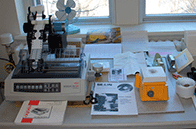 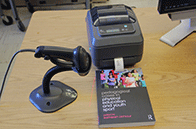
|
|
|


 Managing large amounts of data isn’t new to archival science. What is new are the methods in which data is created, stored and preserved. With each passing year the world continues its evolution into digital-born environments; items that were preserved on paper have now been digitized, or content that was once only on paper is now created electronically. Yet no matter the design, medium or format, archivists are professionally equipped to process, preserve and make accessible the materials people create. Due to the ever-changing nature of these creative methods, all archivists today are digital archivists. Or more accurately, all digital archivists are archivists. Any archivist working today must be prepared to navigate all genres and forms of materials, regardless of job title.
Managing large amounts of data isn’t new to archival science. What is new are the methods in which data is created, stored and preserved. With each passing year the world continues its evolution into digital-born environments; items that were preserved on paper have now been digitized, or content that was once only on paper is now created electronically. Yet no matter the design, medium or format, archivists are professionally equipped to process, preserve and make accessible the materials people create. Due to the ever-changing nature of these creative methods, all archivists today are digital archivists. Or more accurately, all digital archivists are archivists. Any archivist working today must be prepared to navigate all genres and forms of materials, regardless of job title. Long-time philanthropist and contributor to Purdue University Libraries, Thomas S. Wilmeth passed away on January 5, 2015. He was born October 2, 1913. A lifelong entrepreneur, Wilmeth started his first business at age 10. At 16 he enrolled at Purdue. During his senior year, he was the business manager of the Purdue yearbook, Debris. While at Purdue, Wilmeth was a member of Alpha Chi Rho, Tau Beta Pi and Eta Kappa Nu. He graduated magna cum laude at age 21 with a degree in electrical engineering in 1940. Tom and his brother were the founders of Scot Industries, Inc. in 1949. The privately held company is a worldwide quality and technological leader in the specialty tubing and bar business.
Long-time philanthropist and contributor to Purdue University Libraries, Thomas S. Wilmeth passed away on January 5, 2015. He was born October 2, 1913. A lifelong entrepreneur, Wilmeth started his first business at age 10. At 16 he enrolled at Purdue. During his senior year, he was the business manager of the Purdue yearbook, Debris. While at Purdue, Wilmeth was a member of Alpha Chi Rho, Tau Beta Pi and Eta Kappa Nu. He graduated magna cum laude at age 21 with a degree in electrical engineering in 1940. Tom and his brother were the founders of Scot Industries, Inc. in 1949. The privately held company is a worldwide quality and technological leader in the specialty tubing and bar business. Purdue University Libraries donor, Dorothy Newby McCaw, passed away on January 13, 2015. She was born on November 7, 1925. She was an accomplished pianist and cellist and wrote an operetta, “The Pied Piper.” Dorothy moved to Lafayette with her husband in the late 1940s where she raised their three children. She was a founding member of the Lafayette Symphony Orchestra and later served on the Board of Directors. She was an active member of several local volunteer organizations and her family was instrumental in the development of the Triangle Park in downtown Lafayette.
Purdue University Libraries donor, Dorothy Newby McCaw, passed away on January 13, 2015. She was born on November 7, 1925. She was an accomplished pianist and cellist and wrote an operetta, “The Pied Piper.” Dorothy moved to Lafayette with her husband in the late 1940s where she raised their three children. She was a founding member of the Lafayette Symphony Orchestra and later served on the Board of Directors. She was an active member of several local volunteer organizations and her family was instrumental in the development of the Triangle Park in downtown Lafayette.
 Kaitee Hardesty
Kaitee Hardesty Jody Zink
Jody Zink





